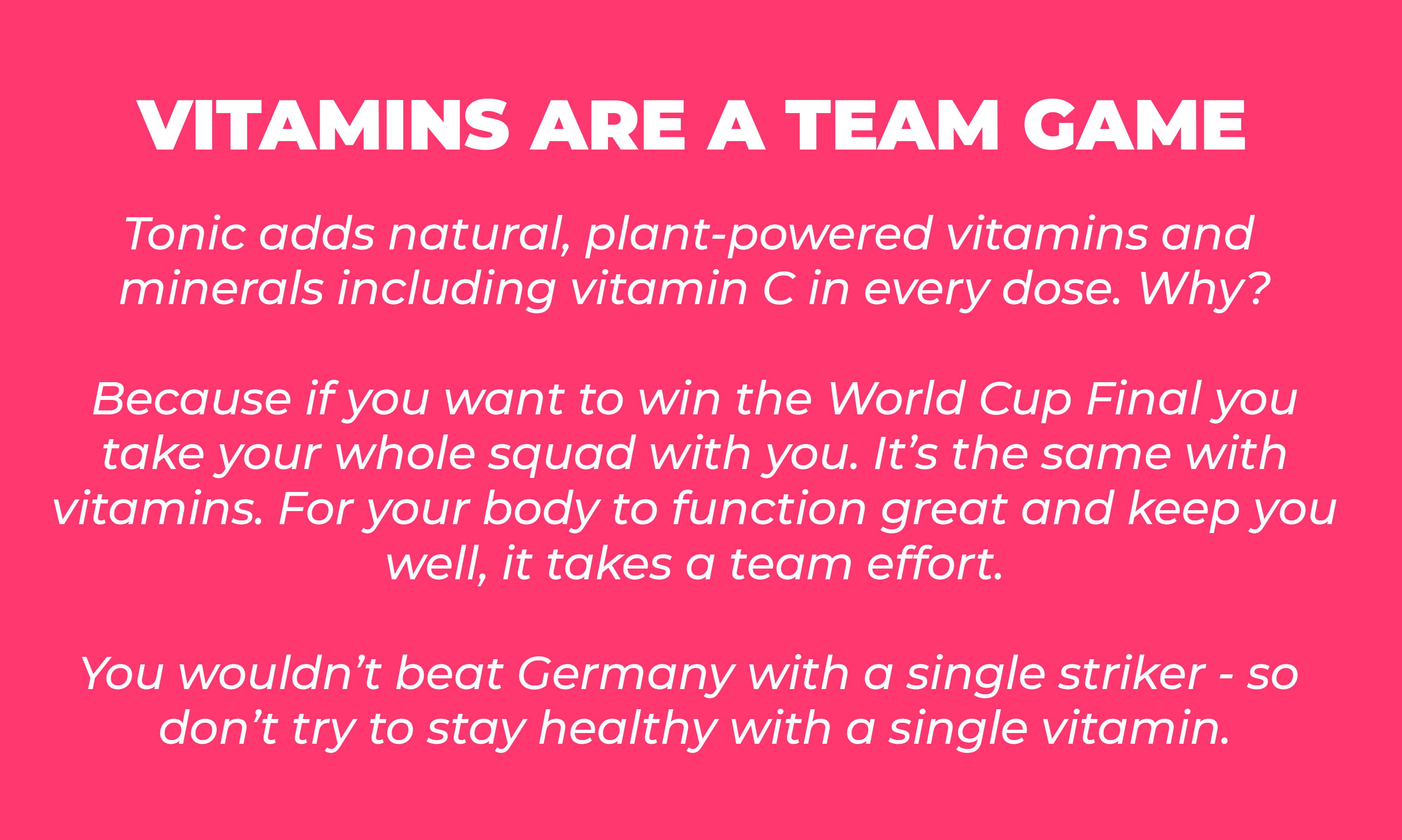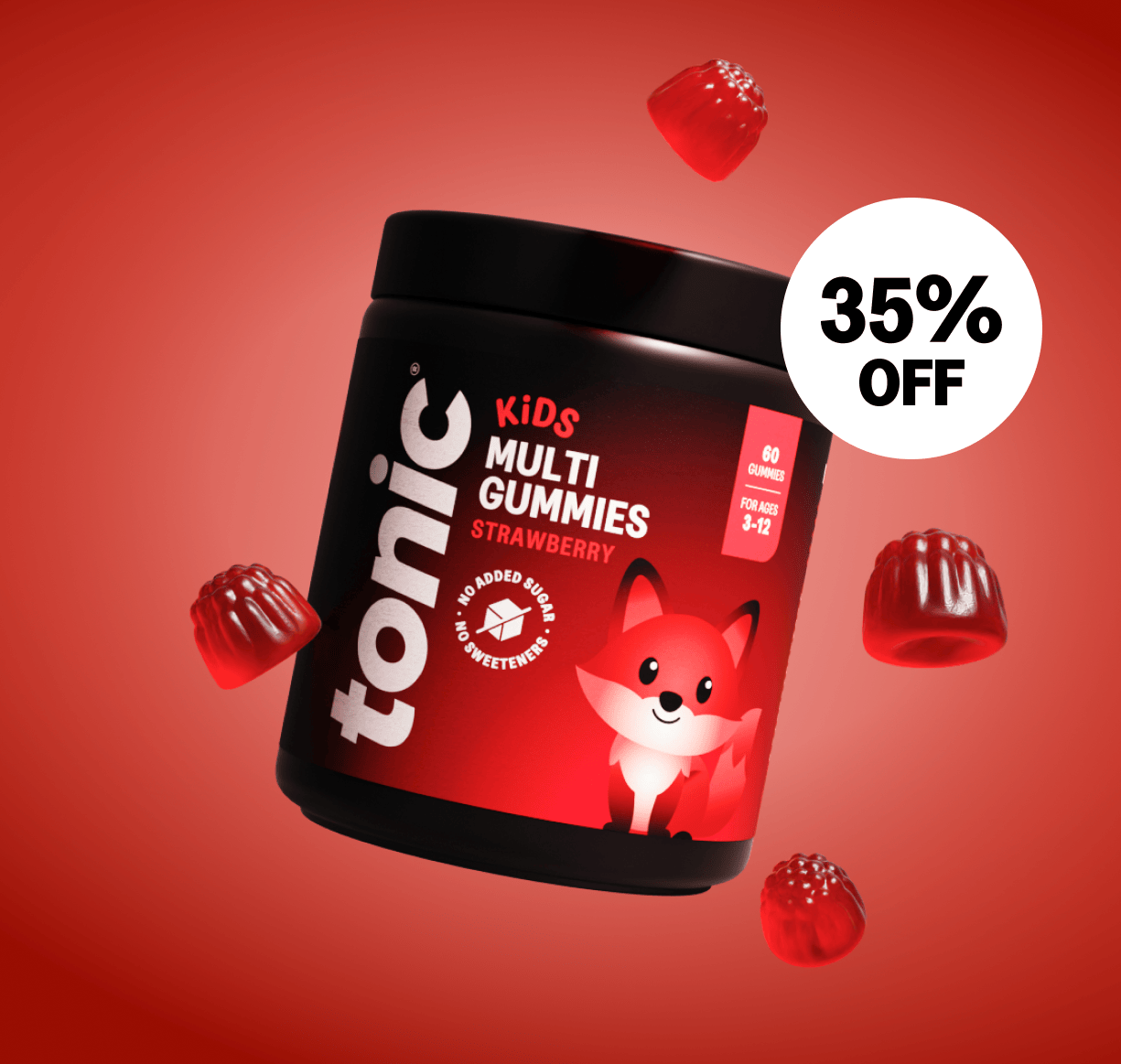What’s so great about vitamin C?
We already know that vitamin C is basically epic. It’s an essential nutrient that keeps your skin, blood vessels, cartilage and bones in top shape and if you cut yourself, it helps your skin to mend. Its benefits are neurological, immunological and cardiovascular.
🍋 Supports the immune system to get you better, faster
🍋 Protects the body against free radicals
🍋 Helps to absorb iron into your body
🍋 Produces collagen to firm up your skin
🍋 Repairs body tissues
🍋 Supports eye health
Can vitamin C prevent a common cold? There are countless studies to show that vitamin C can prevent a cold and also shortens the duration of a cold. There’s nothing more satisfying than a speedy recovery (1).
What’s high strength vitamin C?
Compared to standard vitamin C products, a high strength vitamin C would be 1,000mg or over. Legally, you can go up to 2,000mg.
Tonic adds 1,500mg to our high dose sachets and 1,000mg to our daily immunity tablets. We’ve looked thoroughly into all kinds of vitamin C studies and when it comes to keeping illness at bay or getting rid of colds faster, that’s the amount your immune system needs to stay in top shape.

Why do I need high strength Vitamin C?
The thing with Vitamin C is that your body can’t store everything you need. Because it’s water-soluble, it doesn’t hang around in the body as long as vitamins like A, E and D which are stashed in our fat cells.
If you ate huge amounts of strawberries, kiwis, oranges and peppers every day you’d probably get enough. But let’s be honest, who really lives like that?
Even if you take your NRV (nutrient reference value) of Vitamin C every day, that’s only 80mg, a recommended amount that’s not been updated since WWII. That might keep scurvy at bay but it’s a bit like oiling a rusty hinge with a tiny drop of oil. It’s not enough to keep your immune system in decent shape.
Is 1000mg of Vitamin C too much?
It’s really not, but don’t forget that your need for Vitamin C can vary, depending on what life’s throwing at you. If you’re stressed or fighting off an infection, your body needs more (2 & 3).
For the time being, experts agree that there’s not enough data to exactly specify a safe upper level but huge amounts of research tell us that a dose much higher than the current NRV is beneficial (4).

Does high strength Vitamin C cause a stomach upset?
A megadose of vitamin C (10,000mg or more) can cause some stomach upset, diarrhoea or constipation but for most people, there’ll be no effects at all.
Taking a high strength Vitamin C supplement with food or liquid will help if you’ve got a bit of a sensitive stomach.
If you’re not sure whether you might need to up your intake, these could be telltale signs:
- You’re noticing wrinkles - Vitamin C supports collagen production which plays a key role in the structure of your skin.
- Feeling moody or tired - One of the earliest signs you’re not getting enough.
- Corkscrew-shaped body hair - Weird but true. A lack of Vitamin C affects the protein structure of your hair so that it might grow bent or coiled.
- Aching joints - There can be lots of other causes to keep in mind but a lack of Vitamin C could be one of them.
- Swollen gums - Ouch, that’s the collagen again. Vitamin C is key to blood vessel health in this area and a severe deficiency can even lead to rotten teeth falling out.
- Weight gain - Some studies have linked vitamin C deficiency to higher levels of body fat and in particular, belly fat. Vitamin C may help prevent obesity by regulating the release of fat from fat cells, lowering inflammation and stress. If your weight’s gone up and it’s definitely not the beer, this could be why.
- You’re ill more often - And you recover more slowly. This one’s been the driving factor in us packing an almighty 1,500mg of Vitamin C into each of our high dose sachets.
Is high strength Vitamin C safe in pregnancy?
If you’re healthy with no underlying health conditions then it probably is but you won’t find a health supplement out there that will say so for sure.
There’s always going to be a small percentage of pregnant women who might experience an effect they don’t want so if you’re pregnant, the best person to talk to before you take high strength Vitamin C is your doctor.
How do I take high strength Vitamin C?
In a Tonic sachet of course : ) We’ve combined this superhero vitamin with plant-powered natural extracts and other vitamins and minerals to give your natural immunity the boost it needs to live well.
No sugar, no fillers, nothing nasty at all. And if you drink it up, you’ll be getting the max absorption too.
We’ve done the research and we know the science. High dose Tonic is your natural boost to live life. Shop here.
Sources
1. https://www.ncbi.nlm.nih.gov/pmc/articles/PMC7205675/
2. https://efsa.onlinelibrary.wiley.com/doi/epdf/10.2903/j.efsa.2009.1226
3. https://pubmed.ncbi.nlm.nih.gov/29099763/
4. https://cot.food.gov.uk/committee/committee-on-toxicity/cotreports/cotjointreps/evmreport
Other sources:
https://www.webmd.com/vitamins-and-supplements/ss/slideshow-vitamin-c-deficiency
https://www.northportwellnesscenter.com/blog/vitamin-c-deficiency-symptoms






Leave a comment
All comments are moderated before being published.
This site is protected by hCaptcha and the hCaptcha Privacy Policy and Terms of Service apply.